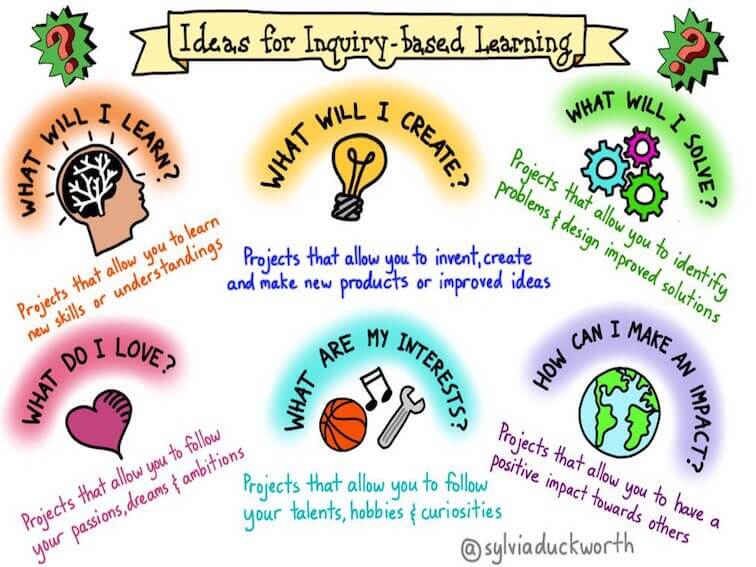
Students Can Use These Questions To Guide Their Inquiry-Based Learning
by TeachThought Staff
Learning through inquiry is one of the most ‘natural’ and organic forms of learning.
In addition to learning through play, mentorship, and self-directed learning, inquiry-based learning happens whether we plan for it or not. When anyone is curious or confused and then uses that curiosity or confusion to drive their own learning, they’re ‘doing’ inquiry-based learning.
Inquiry-based learning provides a framework for students to use one or more questions–often changing in evolving as knowledge levels change–to learn. It is an approach that works well with other teaching trends, such as project-based learning, blended learning, challenge-based learning, place-based education, and more.
The above graphic by Sylvia Duckworth illustrates questions that can help inspire inquiry-based learning ideas that act as a catalyst for curiosity in a way that makes an educational impact as students explore their problem-solving skills.
Add a personalized element when choosing inquiry-based learning projects with questions like:
What will I learn?
What will I create?
What will I solve?
What do I love?
What are my interests?
How can I make an impact?
According to our own Terry Heick in Phases Of Inquiry-Based Learning: A Guide For Teachers, “there are several different inquiry-based learning models, but most have several general elements in common:
Learning is focused on a meaningful, ill-structured problem that demands consideration of diverse perspectives
Academic content-learning occurs as a natural part of the process as students work towards finding solutions
Learners, working collaboratively, assume an active role in the learning process
Teachers provide learners support, ‘What if…”? questions, and rich multiple media sources of information to assist students in successfully finding solutions.
Learners share and defend solutions publicly in some manner.”
The post above then goes on to break the inquiry-based process down into stages, including interaction, clarification, questioning, and design, which are summarized below.
4 Phases Of Inquiry-Based Learning
Interaction
Due to the fact that inquiry is open-ended and curiosity-based, traditional research methods may not be the most effective or interesting way to investigate. Encourage students to interact with unique materials and sources such as peers, experts, or formal and informal media in a playful and exploratory fashion. Students should be engaged in finding a method of research that interests and is available to them.
Clarification
Clarification happens as students begin to dig into the material and gain a greater sense of understanding of their selected topic, their own thinking on the subject, and what steps may be necessary to tackle the project. Students should be focused on the credibility of sources, and have a full understanding of related facts and opinions and the potential influence of that on their own work.
Questioning
One of the more critical phases of inquiry-based learning is questioning. As students begin to form questions to drive self-directed inquiry, any weak spots in their thinking or understanding should become clear in a way that helps them realize the limitations of their scope of work, or begin to develop an understanding of what information is lacking and move forward to resolve any gaps in knowledge.
Design
The final stage of an inquiry-based learning process concentrates on design, or the ability to create an informative and curiosity-driven product that satisfies the initial inquiry creatively. This end result is the answer or solution and should demonstrate the process — and although it is inevitably what students will focus on, true learning happens along the way.
See Also 20 Questions To Guide Inquiry-Based Learning
One of the ultimate goals of education is to instill in students the ability to identify an issue and brainstorm and implement a solution. Inquiry-based learning offers the opportunity to wonder about the world, our place in it, and how we can improve it while providing an important framework for critical thinking and curiosity.
6 Questions Students Can Use To Guide Their Inquiry-Based Learning